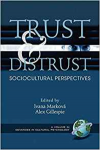Marková, I., & Gillespie, A. (Eds.). (2007). Trust and distrust: Sociocultural perspectives. IAP. ISBN: 978-1-59311-841-9, 299 Seiten, €45.

Trust and distrust: Sociocultural Perspectives provides an astoundingly deep and broad insight into the concept of trust – and affiliated concepts. I wrote, “Affiliated concepts”, in an aim to cover the scope and in-depth discussion of the definition of trust (and distrust) in this book. In the first chapter, the editors lay out the framework for the multitude of trust-related aspects addressed throughout the book respectively. Their general structure of the trust-distrust complex is presented in a space consisting out of four scales: (1) macro-social versus micro-social trust, (2) primary (taken-for-granted) versus reflective trust, (3) a priori generalized trust versus inner dialogicality and (4) basic trust (ontological) versus context-dependent/specific trust. For anyone who is new to scientific literature and jargon, this is a tough one to read. I must say, I find it truly ironic how the editors and several authors in the book point out that the academic debate on establishing a consensus regarding the definition of trust sometimes seems to lead away from what trust is to any common person. Nevertheless, it provides a great insight into the discussions around trust, not just on a theoretical level (as is the case in the first and last chapter of the book).
The way in which the editors framed the book – connecting theoretical considerations with more practical and specific case studies – is a great plus. This way, the readers’ understanding of the macro theoretical frameworks surrounding trust is stimulated and at the same time, it provides them with examples of more specific case studies from around the world. The book is divided into five parts which include several case studies around a certain theme: (I) Trust and Distrust: Forms, History and Development, (II) The Cultural Dynamics of Trust and Distrust, (III) Trust and Distrust within the Dynamics of Social Interaction, (IV) Trust and Distrust in the Baltic States and (V) Concluding Comment. In my opinions, the final part is worth reading to gain an overall impression of the themes handled in the book and its outcomes.
Rezensiert von: Fabienne L.R. Coenders